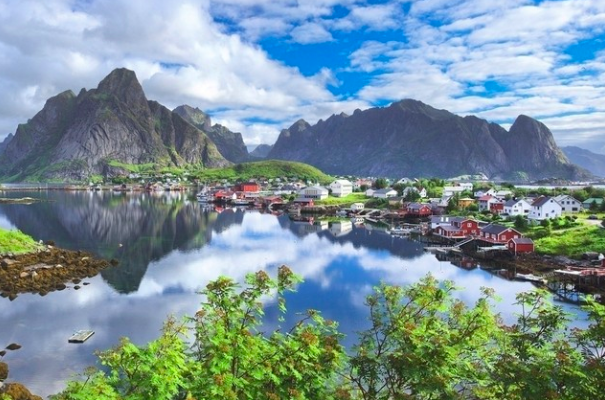
Lofoten Islands
In a decision that caught oil and gas industry executives by surprise, the largest governing party in Norway announced it is withdrawing its support for fossil fuel exploration in the Arctic ocean near the sensitive Lofoten Islands, thereby effectively putting them off limits for development. According to Bloomberg, State-controlled Equinor ASA, the biggest Norwegian oil producer, have said that gaining access to Lofoten is key if the country wants to maintain fuel production — experts had estimated that there are 1 billion to 3 billion barrels of oil in the waters off the Lofoten archipelago.
- “The whole industry is surprised and disappointed,” said Karl Eirik Schjott-Pedersen, head of the Norwegian Oil and Gas Association. “It doesn’t provide the predictability we depend on.” Oil and gas labor unions were angered by the decision.
- Norway is western Europe’s largest oil producer and it exports more than half of its oil, pumping out over 1.6 million barrels of oil a day from its offshore operations.
- The Norwegian government announced recently its plans to tighten restrictions on investing in coal power for its $1 trillion sovereign wealth fund and will instead opt for more investments on renewable-energy.
Meanwhile, back in the U.S., the Trump Administration is going in the opposite direction. Politico reported yesterday that the Administration has a plan to open to oil and gas drilling the federal waters (not close to the shore) of the Eastern Gulf coast off Florida, something that is opposed by every politician, Republican and Democrat, in the state. The Trump Administration in the past had said that Florida was off the table, particularly the Eastern Gulf of Mexico because it is a significant area for the military to conduct training operations, not to mention fisheries and tourism that are drivers of the economy on Florida’s west coast. Last November, a statewide ballot measure banning oil and gas development in state waters passed by a wide margin.
Why This Matters: The Lofoten Islands are a natural wonder with a history that dates back to the Viking age. This no-drilling decision is yet another sign of the disfavor of oil and gas in the face of climate change. It is particularly noteworthy because Norway became a wealthy nation due to the development of its oil and gas reserves. According to Bloomberg, this could be just the beginning — the next battle will be regarding whether to continue to permit drilling in the Barents Sea. Drilling for oil off the US coast is also extremely unpopular — a Quinnipiac University poll of Florida voters conducted in March showed 64 percent oppose the practice. Republicans, though, supported it by a 54-38 percent margin. Many Republicans in Florida worry that if Trump goes ahead with his plan to please the oil and gas industry and open up the coast to drilling, it could cost him the election.
April 11, 2019 » Arctic Ocean, climate change, drilling, Norway, oil and gas, renewables


